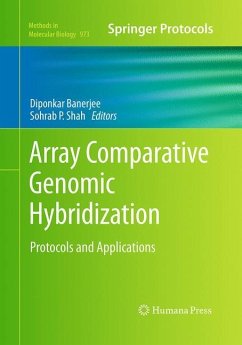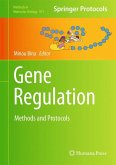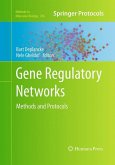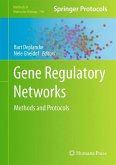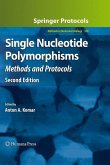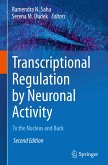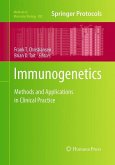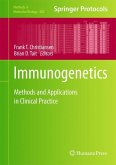Gene Regulation
Methods and Protocols
Herausgegeben:Bina, Minou
Gene Regulation
Methods and Protocols
Herausgegeben:Bina, Minou
- Broschiertes Buch
- Merkliste
- Auf die Merkliste
- Bewerten Bewerten
- Teilen
- Produkt teilen
- Produkterinnerung
- Produkterinnerung
In this volume of Methods in Molecular Biology(TM), expert investigators offer comprehensive, complementary, and cutting-edge technologies for studies of gene regulation. The chapters of Gene Regulation: Methods and Protocols are organized to provide an integrated and a coherent view of control systems and their associated components. The protocols are broad in their scope. They include molecular, biochemical, spectroscopic techniques as well as high throughput strategies. Written in the highly successful Methods in Molecular Biology(TM) series format, chapters include introductions to their…mehr
Andere Kunden interessierten sich auch für
![Gene Regulation Gene Regulation]() Gene Regulation75,99 €
Gene Regulation75,99 €![Gene Regulatory Networks Gene Regulatory Networks]() Gene Regulatory Networks82,99 €
Gene Regulatory Networks82,99 €![Gene Regulatory Networks Gene Regulatory Networks]() Gene Regulatory Networks113,99 €
Gene Regulatory Networks113,99 €![Single Nucleotide Polymorphisms Single Nucleotide Polymorphisms]() Anton A. Komar (ed.)Single Nucleotide Polymorphisms135,99 €
Anton A. Komar (ed.)Single Nucleotide Polymorphisms135,99 €![Transcriptional Regulation by Neuronal Activity Transcriptional Regulation by Neuronal Activity]() Transcriptional Regulation by Neuronal Activity165,99 €
Transcriptional Regulation by Neuronal Activity165,99 €![Immunogenetics Immunogenetics]() Immunogenetics83,99 €
Immunogenetics83,99 €![Immunogenetics Immunogenetics]() Immunogenetics113,99 €
Immunogenetics113,99 €-
-
-
In this volume of Methods in Molecular Biology(TM), expert investigators offer comprehensive, complementary, and cutting-edge technologies for studies of gene regulation. The chapters of Gene Regulation: Methods and Protocols are organized to provide an integrated and a coherent view of control systems and their associated components. The protocols are broad in their scope. They include molecular, biochemical, spectroscopic techniques as well as high throughput strategies. Written in the highly successful Methods in Molecular Biology(TM) series format, chapters include introductions to their respective topics, lists of the necessary materials and reagents, step-by-step, readily reproducible laboratory protocols, and key tips on troubleshooting and avoiding known pitfalls.
Comprehensive and broad in their scope, the protocols are useful to researchers in many disciplines including molecular biology, genomics, biochemistry, biomedicine, nutrition, and agricultural sciences.
Comprehensive and broad in their scope, the protocols are useful to researchers in many disciplines including molecular biology, genomics, biochemistry, biomedicine, nutrition, and agricultural sciences.
Produktdetails
- Produktdetails
- Methods in Molecular Biology 977
- Verlag: Humana / Humana Press / Springer, Berlin
- Artikelnr. des Verlages: 978-1-4939-6288-4
- Softcover reprint of the original 1st ed. 2013
- Seitenzahl: 420
- Erscheinungstermin: 23. August 2016
- Englisch
- Abmessung: 254mm x 178mm x 23mm
- Gewicht: 795g
- ISBN-13: 9781493962884
- ISBN-10: 1493962884
- Artikelnr.: 45670030
- Herstellerkennzeichnung
- Springer-Verlag GmbH
- Tiergartenstr. 17
- 69121 Heidelberg
- ProductSafety@springernature.com
- Methods in Molecular Biology 977
- Verlag: Humana / Humana Press / Springer, Berlin
- Artikelnr. des Verlages: 978-1-4939-6288-4
- Softcover reprint of the original 1st ed. 2013
- Seitenzahl: 420
- Erscheinungstermin: 23. August 2016
- Englisch
- Abmessung: 254mm x 178mm x 23mm
- Gewicht: 795g
- ISBN-13: 9781493962884
- ISBN-10: 1493962884
- Artikelnr.: 45670030
- Herstellerkennzeichnung
- Springer-Verlag GmbH
- Tiergartenstr. 17
- 69121 Heidelberg
- ProductSafety@springernature.com
Gene Regulation.- Isolation of Nuclei for use in Genome-wide DNase Hypersensitivity Assays to Probe Chromatin Structure.- DNase I Digestion of Isolated Nulcei for Genome-Wide Mapping of DNase Hypersensitivity Sites in Chromatin.- Isolation and Analysis of DNA Derived from Nucleosome-Free Regions.- Acquisition of High Quality DNA for Massive Parallel Sequencing by in vivo Chromatin Immunoprecipitation.- Luciferase Assay to Study the Activity of a Cloned Promoter DNA Fragment.- Promoter Deletion Analysis using a Dual-luciferase Reporter System.- Application of mRNA Display for in vitro Selection of DNA-binding Transcription Factor Complexes.- Isolation of Intracellular Protein:DNA Complexes using HaloCHIP; An Antibody Free Alternative to Chromatin Immunoprecipitation.- A Modified Yeast One-Hybrid System for Genome Wide Identification of Transcription Factor Binding Sites.- Identifying Specific Protein--DNA Interactions using SILAC--based Quantitative Proteomics.- Electrophoretic Mobility-Shift and Super-Shift Assays for Studies and Characterization of Protein-DNA Complexes.- Combination of Native and Denaturing PAGE for the Detection of Protein Binding Regions in Long Fragments of Genomic DNA.- Quantitative NanoProteomics Approach for Protein Complex (QNanoPX) using Gold Nanoparticle-based DNA Probe.- Chromatin Assembly and In Vitro Transcription Analyses for Evaluation of Individual Protein Activities in Multicomponent Transcriptional Complexes.- Using FRET to Monitor Protein-induced DNA Bending: The TBP-TATA Complex as a Model System.- Promoter Independent Abortive Transcription Assays Unravel Functional Interactions Between TFIIB and RNA Polymerase.- Fluorescence Cross-correlation Spectroscopy (FCCS) to Observe Dimerization of Transcription Factors in Living Cells.- Nuclear Recruitment Assay as a Tool to validate Transcription Factor Interactions in Mammalian Cells.- Preparation of Cell Lines for Single-Cell Analysis of TranscriptionalActivation Dynamics.- Peptide Microarrays for Profiling of Serine/threonine Kinase Activity of Recombinant Kinases and Lysates of Cells and Tissue Samples.- Immunoaffinity Purification of Protein Complexes from Mammalian Cells.- Simple and Efficient Identification of Chromatin Modifying Complexes and Characterization of Complex Composition.- Heavy Methyl-SILAC Labeling Coupled with Liquid Chromatography and High-resolution Mass Spectrometry to Study the Dynamics of Site-specific Histone Methylation.- Analysis of p300 Occupancy at the Early Stage of Stem Cell Differentiation by Chromatin Immunoprecipitation.- Mammalian Two-Hybrid Assays for Studies of Interaction of p300 with Transcription Factors.- Fluorescence Anisotropy Microplate Assay to Investigate the Interaction of Full-length Steroid Receptor Coactivator-1a with Steroid Receptors.- Use of Histone Deacetylase Inhibitors to Examine the Roles of Bromodomain and Histone Acetylation in p300-dependent Gene Expression.- Histone Deacetylases Valproic Acid as a Small Molecule Inducer to Direct the Differentiation of Pluripotent Stem Cells.- Sedimentation and Immunoprecipitation Assays for Analyzing Complexes that Repress Transcription.- Methods for Studies of Protein Interactions with Different DNA Methyltransferases.
Gene Regulation.- Isolation of Nuclei for use in Genome-wide DNase Hypersensitivity Assays to Probe Chromatin Structure.- DNase I Digestion of Isolated Nulcei for Genome-Wide Mapping of DNase Hypersensitivity Sites in Chromatin.- Isolation and Analysis of DNA Derived from Nucleosome-Free Regions.- Acquisition of High Quality DNA for Massive Parallel Sequencing by in vivo Chromatin Immunoprecipitation.- Luciferase Assay to Study the Activity of a Cloned Promoter DNA Fragment.- Promoter Deletion Analysis using a Dual-luciferase Reporter System.- Application of mRNA Display for in vitro Selection of DNA-binding Transcription Factor Complexes.- Isolation of Intracellular Protein:DNA Complexes using HaloCHIP; An Antibody Free Alternative to Chromatin Immunoprecipitation.- A Modified Yeast One-Hybrid System for Genome Wide Identification of Transcription Factor Binding Sites.- Identifying Specific Protein--DNA Interactions using SILAC--based Quantitative Proteomics.- Electrophoretic Mobility-Shift and Super-Shift Assays for Studies and Characterization of Protein-DNA Complexes.- Combination of Native and Denaturing PAGE for the Detection of Protein Binding Regions in Long Fragments of Genomic DNA.- Quantitative NanoProteomics Approach for Protein Complex (QNanoPX) using Gold Nanoparticle-based DNA Probe.- Chromatin Assembly and In Vitro Transcription Analyses for Evaluation of Individual Protein Activities in Multicomponent Transcriptional Complexes.- Using FRET to Monitor Protein-induced DNA Bending: The TBP-TATA Complex as a Model System.- Promoter Independent Abortive Transcription Assays Unravel Functional Interactions Between TFIIB and RNA Polymerase.- Fluorescence Cross-correlation Spectroscopy (FCCS) to Observe Dimerization of Transcription Factors in Living Cells.- Nuclear Recruitment Assay as a Tool to validate Transcription Factor Interactions in Mammalian Cells.- Preparation of Cell Lines for Single-Cell Analysis of TranscriptionalActivation Dynamics.- Peptide Microarrays for Profiling of Serine/threonine Kinase Activity of Recombinant Kinases and Lysates of Cells and Tissue Samples.- Immunoaffinity Purification of Protein Complexes from Mammalian Cells.- Simple and Efficient Identification of Chromatin Modifying Complexes and Characterization of Complex Composition.- Heavy Methyl-SILAC Labeling Coupled with Liquid Chromatography and High-resolution Mass Spectrometry to Study the Dynamics of Site-specific Histone Methylation.- Analysis of p300 Occupancy at the Early Stage of Stem Cell Differentiation by Chromatin Immunoprecipitation.- Mammalian Two-Hybrid Assays for Studies of Interaction of p300 with Transcription Factors.- Fluorescence Anisotropy Microplate Assay to Investigate the Interaction of Full-length Steroid Receptor Coactivator-1a with Steroid Receptors.- Use of Histone Deacetylase Inhibitors to Examine the Roles of Bromodomain and Histone Acetylation in p300-dependent Gene Expression.- Histone Deacetylases Valproic Acid as a Small Molecule Inducer to Direct the Differentiation of Pluripotent Stem Cells.- Sedimentation and Immunoprecipitation Assays for Analyzing Complexes that Repress Transcription.- Methods for Studies of Protein Interactions with Different DNA Methyltransferases.

